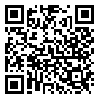Volume 8, Issue 1 (6-2021)
nbr 2021, 8(1): 46-55 |
Back to browse issues page
Download citation:
BibTeX | RIS | EndNote | Medlars | ProCite | Reference Manager | RefWorks
Send citation to:



BibTeX | RIS | EndNote | Medlars | ProCite | Reference Manager | RefWorks
Send citation to:
Heidari N. Sexual dimorphism in digit length ratios of the second to fourth digits (2D:4D) in Blanford's fringe-toed lizard Acanthodactylus blanfordi Boulenger, 1918 (Sauria: Lacertidae) in the south of Iran. nbr 2021; 8 (1) :46-55
URL: http://nbr.khu.ac.ir/article-1-3387-en.html
URL: http://nbr.khu.ac.ir/article-1-3387-en.html
Department of Animal Biology, Faculty of Biological Sciences, Kharazmi University, Tehran, Iran , heydari.ns@gmail.com
Abstract: (2966 Views)
Finger length ratios are organized during embryonic development of fingers as they exposed to sex steroid hormones, and may show varying degrees of sexual dimorphism between males and females in different animal groups. Among all the finger length ratios calculated in a sample, the ratio between the second to fourth fingers (2D: 4D) is the most important one. In this study, the 2D:4D ratios in both sides of the body (right and left) in all limbs were investigated to determine if sexual dimorphism is present in the 2D: 4D ratios in 44 specimens studied (20 males and 24 females) of Acanthodactylus blanfordi. Other morphological traits of the two sexes were also examined (23 metric and meristic traits), as a result, sexual dimorphism was observed in five metric and meristic morphological traits. In terms of the ratio of the size of the fingers and toes, sexual dimorphism in the length of the fingers was observed only in 2D: 4D on the right side of the body in forelimbs and hindlimbs. The value of this trait was higher in males than females and this difference was statistically significant P ≤0.05).
Type of Study: Original Article |
Subject:
Animal Biology
Received: 2020/08/11 | Revised: 2021/06/5 | Accepted: 2020/10/22 | Published: 2021/06/5 | ePublished: 2021/06/5
Received: 2020/08/11 | Revised: 2021/06/5 | Accepted: 2020/10/22 | Published: 2021/06/5 | ePublished: 2021/06/5
Send email to the article author
| Rights and permissions | |
 |
This work is licensed under a Creative Commons Attribution-NonCommercial 4.0 International License. |







